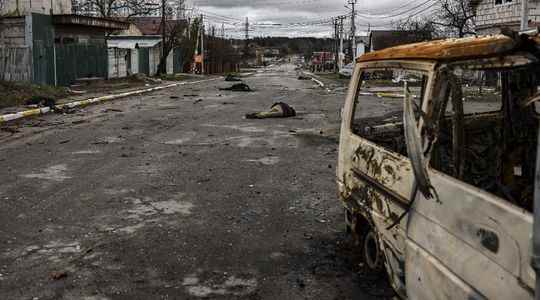Corpses along the streets, men, women and children piled up in mass graves, the unbearable discovery by the Ukrainians of the abuses committed by the Russian army on the abandoned territories has stirred the hearts of the international community, which is trying to find the right words to qualify the unspeakable. So, “war crimes”, “crimes against humanity” or “genocide”, which term best describes the current situation in Ukraine?
The war crime, a breach of the Geneva Conventions
Globally ratified, the four Geneva Conventions have dictated, since 1949, the rules of conduct to be adopted in the event of armed conflict. Because if war is a right, it includes a series of duties that any belligerent is prohibited from violating in the name of international humanitarian law. “A war crime can thus be defined by a violation of the Geneva Conventions”, explains the geographer Jean-François Martin.
Thus, looting, murder, deportation of civilian populations, execution of hostages, destruction of property not justified by military purposes constitute war crimes. “Without a doubt, Russia can be accused of not respecting this convention of which it is a signatory”, assures the geographer. Indeed, the discovery of hundreds of civilians shot dead, often with their hands tied behind their backs, is reminiscent of executions. However, since 1998, this crime has come under the judgment of the International Criminal Court, which uses the list of the Geneva Conventions to qualify it. It also opened an investigation on March 2 into Russia’s reprehensible acts on Ukrainian territory. It is also she who has jurisdiction to judge crimes of genocide and crimes against humanity.
The crime against humanity, a widespread attack
If any isolated extortion targeting persons not taking part in the combat can be qualified as a war crime, the crime against humanity takes on a more general character. Article 7 of the Treaty of Rome defines it as acts of extermination, enslavement or forced deportation of people.
It was at the Nuremberg trial in 1945, during the judgment of senior Nazi officials, that this term was used during a judgment for the first time. Born of a particular context – the mass deportation and extermination of the Jewish people -, the concept of crime against humanity was generalized to international legislation by a UN resolution passed in 1948.
As a general instruction emanating from a political or military power, it differs from the more sporadic war crime. “We do not know if Vladimir Putin gave the order to commit massacres by leaving the kyiv region and the north of the country, but in any case he did not say not to do it”, explains Galia Ackerman, historian specializing in post-Soviet Russia. Proving that Russia used the crime as one weapon among others would allow it to be tried for crimes against humanity.
The crime of genocide, the extermination of a nation
The Polish Prime Minister called on Monday, April 4, to create an international commission of inquiry into “the genocide” committed, according to him, by the Russian army in Ukrainian cities, including Boutcha. “These bloody massacres committed by Russians, Russian soldiers, deserve to be called by their name. It is genocide, and it must be judged,” Mateusz Morawiecki told reporters.
“Destroying a nation can be considered a crime of genocide”, confirms Jean-François Martin. Especially since by always denying the existence of the Ukrainian nation, Vladimir Putin could easily be accused of it. Several intelligence services said that the master of the Kremlin had given the mission of some of his men to kill the Ukrainian president, Volodymyr Zelensky.
But the crime of genocide, defined by Article 6 of the Treaty of Rome, requires obtaining proof of destruction on a larger scale than for the two previous incriminations. “The Russian army has shown extreme barbarism since the beginning of the invasion”, remarks Galia Ackerman, but the latest abuses observed, as horrible as they are, remain confined to certain cities, those that the Russians are leaving, such as a final act of barbaric revenge. And not yet of a genocide.
